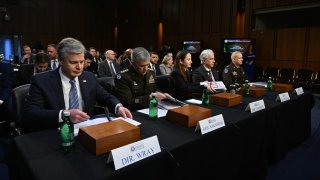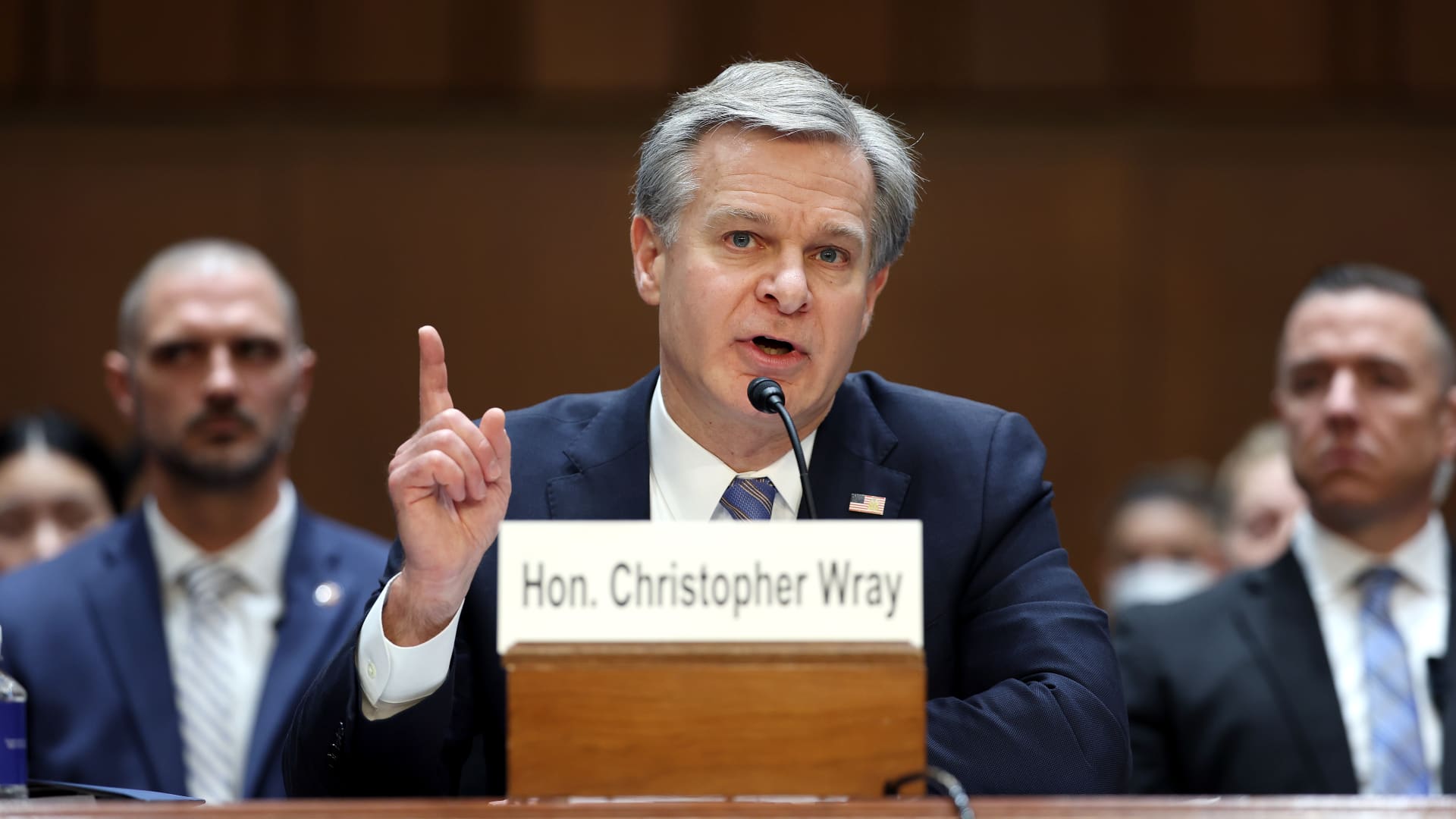
- More than half of the world's population will cast votes this year, making election security a global risk.
- The role of A.I. in spreading misinformation that influences voters, including use of deepfakes, is a central concern.
- U.S. Cyber Command Commander, NSA Director and Central Security Service Chief General Paul Nakasone and FBI Director Christopher Wray spoke at Tuesday's CNBC CEO Council Virtual Roundtable about the government's approach to the issue.

More than half of the world's population will cast votes this year, making election security a global risk to democracy that extends far beyond the U.S. A rising risk component in democratic elections is the role of artificial intelligence in spreading misinformation that influences voters, including the use of deepfakes.
The risk isn't new, according to FBI Director Christopher Wray, who noted at Tuesday's CNBC CEO Council Virtual Roundtable on AI that information warfare, disinformation, and misinformation have been around for decades. What has taken place on social media in recent election cycles was the "next escalation of it," Wray said, but he added, "It wasn't a new weapon. It's just a new way of making that weapon more effective," with threat actors able to create more credible fake personas, more sophisticated false messages, and manufacture evidence that's harder to discern as phony.
Get Tri-state area news and weather forecasts to your inbox. Sign up for NBC New York newsletters.
Experts are already noting the potential for generative AI to become a weapon of information warfare and spread disinformation or misinformation. This summer, for example, a super PAC in support of Florida Governor Ron DeSantis' campaign used AI to make it seem like Donald Trump was reading his controversial tweets out loud. At the time, the ad did not disclose that Trump's voice was AI-generated. And because AI makes it that much easier to produce content that perfectly aligns with a campaign's ideology, its use has been ramping up in political campaigns.
When used with ill intent, the fake images, likenesses, and voices can easily mislead voters and amplify bias, and it's an issue that Wray and U.S. Cyber Command Commander, NSA Director and Central Security Service Chief General Paul Nakasone, are working on together. Elections, in fact, are an issue where the growing partnership between the NSA and FBI on cyber threats was cemented years ago, working on the security of the 2018 midterm elections.
Nakasone also cited work the agencies and others in national intelligence had conducted together in the Fall of 2020 when Iranians were using a type of deepfake capability and the government was able to identify it and share the information publicly.
Money Report
"It completely took the wind out of the sails of the Iranian effort because it exposed what they were up to," Wray said of the effort.
Now, Nakasone said, the election security group at the National Security Agency and U.S. Cyber Command is looking at what happened in the past, and what's happening currently in the cyber realm, and "what are the threats that may come up that we haven't thought about previously? What's the technology, and how might we be able to look at it? ... This has already begun for us."
The FBI director said the agency's primary task is to prevent the influence of foreign actors and the source of the information, not the content. "We're not the truth police. We don't aspire to be. What we're focused on is foreign intelligence services, hostile foreign intelligence services creating fake personas, attempting to persuade people that they're something they're not, right, appearing to be American, when they're actually the Chinese, the Russian, or Iranian intelligence services. And so what we try to do together is ferret that out and then share it with people who need to know about it," he said.
Wray stressed that the partnerships to combat election misinformation need to bring in the private sector as well, and in particular, the A.I. companies, many of which are very actively engaged in the fight to help detect deepfakes. "In some ways, A.I. is quite good at detecting A.I.," he said. "And so seeing the private sector invest its own time and money ... is an important piece of it."
Americans and election voting confidence
According to the Pew Research Center, 66% of the voting-eligible population participated in the 2020 presidential election, which was the highest rate for any national election since 1900.
Currently, there are no federal laws or regulations that prevent the use of AI in political advertisements, but thirteen states have begun taking action to regulate it, according to JD Supra. And in late November, Meta announced that it would start mandating AI ad disclosures and blocking new ads during the final week of elections.
If voter turnout were to drastically drop due to the influence of AI, the legitimacy of democracy and the final outcome of the election would be at risk. But Wray countered the view that Americans lack confidence in the election system. "Most of the things that we have seen in terms of election threats, for example, in terms of cyber threats, are focused on parts of election infrastructure that wouldn't have any impact on the counting of the vote," he said. "The bigger concern is the ability of foreign adversaries to create chaos and lack of confidence, even when confidence should otherwise be there, which then creates almost a futility effect for voters in terms of whether they think their vote's going to be counted."
This risk is a primary reason why it is critical for the government and its partners to identify the threats and share them with the public, or as Wray put it, the "intelligence community trying to lean further forward in trying to shine more sunlight, if you will, on what we're seeing from foreign adversaries, on the theory that the best way to build resilience in the system is sharing information, sharing information with election officials, sharing information with the public, sharing information with other partners who can take action."
Wray also noted that engagement with state election entities has exponentially grown, both in terms of quantity and quality, over the various election cycles since both he and Nakasone have been in their positions, which includes sharing classified information in certain instances so they are better equipped at the state level to figure out how to harden their systems and anticipate the threats. "The election infrastructure in this country is in the hands of the states. And so we view our role as trying to arm them with information, so that they can invest wisely in their own cybersecurity to protect against the possibility of disruption or interference," Wray said.
"This is our A-team," Nakasone said. "This is the best of what FBI has, NSA, Cyber Command, Justice, Homeland Security. And it's not where we're starting in a few months. We're now. We're doing it now. It's something that we have thought a lot about. It's a very, very ready blueprint we have used previously, and we're going to utilize it again."
Watch the full interview from the CNBC CEO Council Virtual Roundtable below.






